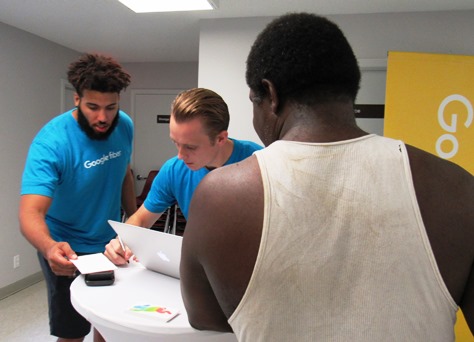by Mary Rupert
Spanning the digital divide takes the effort of more than one group in Wyandotte County.
On Wednesday, residents of a public housing complex in Kansas City, Kan., signed up for Internet service with help from Google Fiber, Connecting for Good and the Surplus Exchange.
One resident of the Cyrus K. Holliday public housing complex at 1750 S. 37th Court in Kansas City, Kan., who signed up for the Internet on Wednesday said it will be very helpful for the children to do their homework at home. Sometimes their homework involves accessing the Internet, she said.
Rachel Merlo, Google Fiber community impact manager, said Google Fiber has worked with the Kansas City, Kan., Public Housing Authority to identify families with kindergarten through 12th grade children to help them close the homework gap – where they don’t have access to the Internet at home.

At the same time, there are benefits for adults, such as access to job postings, Merlo said. In serving similar communities in Kansas City, Mo., since February, they have already seen residents using the Internet to find a job, to find a car to go to the job, and to make child care arrangements, Merlo said.
One resident is now going to school and will be able to use the Internet in her adult education, Merlo said. Some residents are just figuring out how to use computers and the Internet to stay in touch with friends and family, and some have tried video conferencing.
While many families already have a smart phone, this program is partnering with nonprofit organizations to bring low-cost, refurbished devices such as a laptop or desktop computer to do some of the more highly involved tasks, such as a job search, Merlo said. The organizations also provide them with free training.
Merlo said she would love to see all the residents of the 60 units in the Cyrus Holliday complex sign up for the free service. Often there is a lot of excitement at the beginning for the service, then followed by more signups later. There sometimes is skepticism from people who wonder if it is really free and think that they might be billed later, so she said Google and the organizations work to build trust in the community.
Merlo said two more Housing Authority properties, including Chalet Manor, will come on line this year. There are plans to connect a total of seven Housing Authority sites in Kansas City, Kan., eventually, according to Connecting for Good.
Tom Esselman, CEO of Connecting for Good, said a combination of available Internet connectivity, computer devices and training were offered at the housing site on Wednesday. All three have to go together for people to improve their lives through the technology, he said.
Connecting for Good tries to take the emphasis away from the technology and more toward life improvement, he said. Esselman said the organization helps with education skills, career skills and life skills.
“So much of our world is digitalized any more, that for people who live in low-income diverse areas, many of them have not even had access to those skills,” he said. “Now that they have the access, we want to make sure that they are able to take advantage of them,” he said.
Connecting for Good provides free training classes, he said, and it provides some used computers and equipment on a smaller scale. Surplus Exchange does recycling of computers on a larger scale, he added.
In Wyandotte County, Connecting for Good works with Workforce Partners, he said. Connecting for Good trains people on how to refurbish and work with computers. Interns refurbish computers, then the computers are made available to
That allows the organization to make computers available for $50 or $75, prices that some low-income people can afford, he said. The organization has been doing this program for four years, he added.
“People get more use out of equipment that they have had to pay money for,” he said. “They feel that they have bought into it.”
It also helps Connecting for Good, a small not-for-profit, offset some of its costs, he added.
“We partner in every Housing Authority site,” Esselman said. Google Fiber provides the connectivity, Surplus Exchange provides the hardware, with some help from Connecting for Good, and Connecting for Good provides the training, he added. The Kansas City, Kan., Housing Authority is also a partner, has provided a location for Connecting for Good at Juniper Gardens, and supports the ability of these organizations to do the work, he added.
“It opens up whole new worlds for them,” Esselman said.

